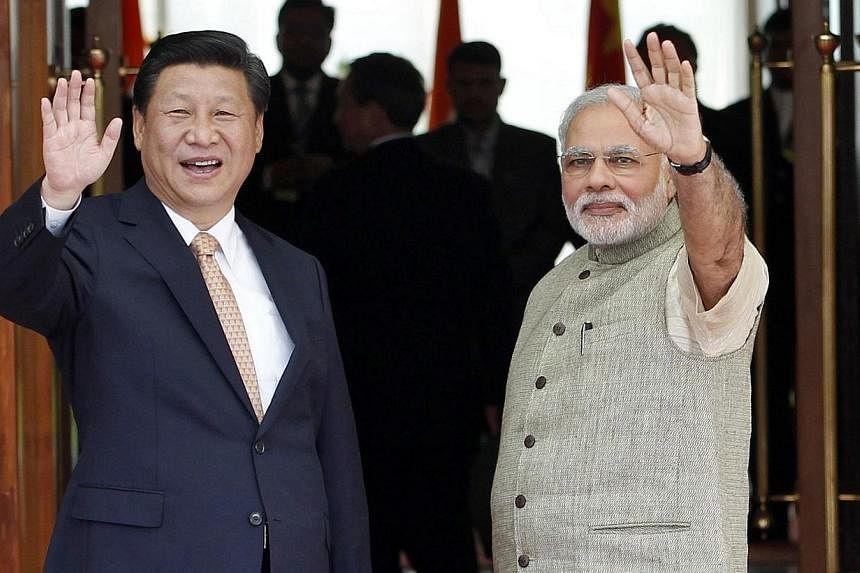AHMEDABAD, India (AFP) - India's new prime minister rolled out the red carpet for Chinese President Xi Jinping in his home town on Wednesday, as the Chinese leader began a maiden visit with both sides seeking to reset the relationship between Asia's rival superpowers.
Mr Narendra Modi has pulled out all the stops for Mr Xi's arrival, organising an intimate riverside dinner in Ahmedabad, the main city in his home state of Gujarat, where giant billboards in Chinese, Gujarati and English have been put up to welcome him.
Border issues are on the agenda for Mr Xi's visit, which comes amid reports in India of Chinese incursions along the de-facto frontier. But both sides say they want to focus on economic cooperation, with India seeking Chinese funding for an overhaul of its dilapidated railways and cooperation in nuclear energy.
The two countries signed several agreements on Wednesday, including one to set up a Chinese-backed industrial park in Gujarat. Wednesday's agenda was deliberately informal, including a visit to the former hermitage of independence leader Mahatma Gandhi and a riverside stroll.
Mr Modi, who celebrates his 64th birthday on Wednesday, has planned a private dinner in a luxury tent before Mr Xi flies to New Delhi.
Workers were out in force on the roads leading to Ahmedabad airport ahead of Xi's arrival, repainting white lines and levelling the surface.
But not everything went smoothly. Mr Xi's Air China plane sat on the tarmac for several minutes as workers appeared to struggle to attach stairs to allow him and his wife Peng Liyuan to disembark.
Mr Xi will hold official talks with Mr Modi and India's President Pranab Mukherjee on Thursday, when the two sides will sign a series of agreements expected to include nuclear cooperation.
China is India's biggest trading partner, with annual two-way commerce of more than US$65 billion (S$82 billion). But Indian data shows the trade deficit with China has soared to more than US$40 billion from just US$1 billion in 2001-2002.
Experts said China would seek to allay Indian concerns over the widening deficit as it tries to cement its relationship with its western neighbour at a time of heightened tensions with Japan and several South-east Asian nations over disputed sea territory.
Mr Modi enjoys a close relationship with Japan's President Shinzo Abe, and analysts have said he may be able to leverage Beijing's rivalry with Tokyo to secure Chinese investment.
China's consul-general in Mumbai Liu Youfa told the Times of India daily ahead of the visit that Mr Xi would "commit investments of over US$100 billion", pointing out that this was three times the amount pledged by Japan during a visit by Mr Modi earlier this month.
Mr Xi heads to India after visiting the Maldives and Sri Lanka as China increasingly asserts its influence in a region that has traditionally come under India's sphere of influence.
Some in New Delhi still fear China's growing engagement in the region is a deliberate strategy to encircle India.
The presence in India of the Dalai Lama, Tibet's exiled spiritual leader, is another source of tension between India and China.
Police in New Delhi detained around 10 Tibetan protesters outside the Chinese Embassy on Wednesday morning.
With both sides eager to emphasise cooperation over competition, Mr Xi said in an article published on Wednesday that "the world's factory and the world's back office" made a winning combination, welcoming Indian businesses to China and pledging much-needed funding for infrastructure development.
"China-India relations have become one of the most dynamic and promising bilateral relations in the 21st century," wrote Mr Xi in the article in The Hindu daily.
Despite his hardline nationalist reputation, Mr Modi moved quickly to engage with China after winning office this year on a campaign promise to revive India's flagging economy, which experts say has been held back by weak infrastructure.
But Mr Modi has also made clear he sees China as a competitor and intends to pursue a more muscular foreign policy than the previous centre-left Congress party government.
During his election campaign, he said that China would have to shed what he called its "expansionist mindset", although he also spoke of his admiration for China's economic success.
The neighbours, now nuclear-armed, fought a brief but bloody war in 1962 over the Indian state of Arunachal Pradesh in the eastern Himalayas, and are still embroiled in a bitter dispute over the territory.

